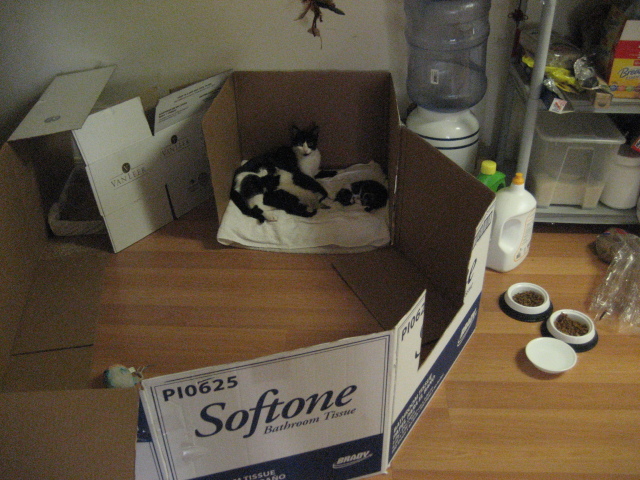QuestionHello,
A neighbor has an outdoor cat which my wife and I (both cat lovers)have really grown fond of. When temperatures got cold here we felt terrible for the cat. My wife went over and talked to the owner and asked if she wouldn't please allow the cat inside for the winter. She said that the cat didn't want to be in the house.
So, I built it a sturdy and insulated house and put it on her porch. Good news, the cat likes the house and seems to be doing ok.
Now the problem. Another neighbor says she hates cats and will kill our adopted feline if she ever catches it in her yard.
Yesterday the local humane society was at her house and erected a large trap for the cat. It breaks out hearts!
I went and told the cat owner and she kept the cat indoors overnight, but this morning the cat is outside again and we can't stop worrying about it. It is such a sweet cat. Note: we would adopt it but we already have a cat who is very territorial and jealous.
I'm wondering if you have any advice on how I can keep the cat from going in the "cat-haters" yard? If only we could keep it out of her yard, all should be OK.
Thanks in advance for any advice.
AnswerKirby,
You are in a tough spot, living between someone who believes that their cat doesn't want to live indoors and someone who makes awful threats about what will happen to this kitty if s/he catches said feline in his/her yard.
Sadly some people believe that cats are unhappy indoors and that the only way to fulfill a pet cat is to allow that cat to roam freely outside. Many folks don't realize that there are serious dangers for outdoor only or indoor/outdoor kitties ranging from being hit by a car, contracting serious contagious illnesses, succumbing to the elements in any season, being accidentally/intentionally poisoned or even becoming victims of horrible acts of cruelty (via nasty neighbors, teens being initiated into gangs, etc). Unfortunately although attitudes are slowing changing many people still view cats as "just an animal", this may be the case with the neighbor who provides basic care for this kitty.
We were recently put into a tough spot with the same issue - on my way to an appointment I saw a cat run in front of a bus, she was nearly hit. I managed to catch the cat, call my husband (luckily he was off that day) and have him set the kitty up in our spare bathroom until after my appointment. When I came home we spent much of our day getting "FOUND KITTY" posters printed up and distributing them throughout the area where the kitty was found. To our surprise while putting up said found kitty posters we ran into some young people who knew the cat and the family she belongs with so they took one of the posters over to their friend's house. When we got home we found a message on our answering machine regarding this kitty so we called back. The family made immediate arrangements to pick up their cat and even after hearing the close call that their pet had I was really surprised at their response which was essentially "It's not the first time this has happened and it won't be the last." While it broke our hearts to hear the people responsible for caring for and protecting this sweet kitty write off our legitimate concerns there really wasn't much we can do about it. There are no local ordinances preventing pet parents from allowing their cats to roam the neighborhood freely.
Somehow I suspect that the cat's current caregiver feels the same way about her kitty and I really wish that I had some magical solution to keep the cat out of your cat hating neighbor's yard, but unfortunately short of keeping the cat indoors I don't have anything to offer. My recommendation would be to take some time, speak with your neighbor and let him/her know just how serious your concerns are for his/her kitty. If you truly feel that this cat is in imminent danger at the hands of the cat loathing neighbor be sure that you get that point across, make sure that this pet guardian is fully aware of the risk that his/her kitty is being exposed to by being allowed to roam freely without supervision.
You may even want to consider offering daytime cat sitting services to your neighbor to help keep this kitty safe. I realize that you have a fairly territorial kitty, but if you take the path of slowly introducing this kitty into the household by housing him/her in your spare bedroom or a bathroom you'll be likely to minimize the backlash from your own resident kitty. Who knows, maybe the cat's guardian will actually allow you to adopt the kitty since you're so concerned about his/her welfare in which case you can try the gradual introduction to the household by keeping kitty housed in his own room with food, water, litter, toys, a cozy place to sleep and scratch pads/posts for a minimum of 2-3 weeks. Given your description of your resident cat's feelings toward other kitties it's not unreasonable for him to hiss, growl and grumble as he passes the door for a short period of time. Obviously if the aggressive behaviors escalate or continue without improving after a period of 3-5 weeks then you may have to resort to finding the new kitty a new home where he will be kept safely indoors. My recommendation would be that you don't try any introductions if one or both cats have yet to be neutered - sex hormones greatly increase territorial behavior and aggression in cats, if one/both kitties are neutered it's less likely that they will get into a real fight over territory or begin using urine/feces to mark their territory. There are other health and behavioral benefits to having cats spayed/neutered (preferably as early as possible) and if you'd like more information on that subject you can contact me again, I'd be more than happy to help out.
Often times proper introductions between new cats allow for much better outcomes, but it would take patience, persistance and consistency to introduce the new kitty into your household and have your resident kitty accept him as a friend. You may want to consider using an old facecloth or hand towel to rub the new kitty down, then your resident kitty, then the new kitty again - this allows the two cats to become accustomed to each other's scents without having the added stress of seeing each other at the same time, this can also be accomplished by trading kitty beds back and forth between the cats. In order to accelerate the process of acceptance you'd want to feed the two cats something extra yummy on either side of the closed door at least 1-2 daily so that they can learn to associate each other's scents, sounds, presence with something positive - FOOD!
It's also important when introducing a new cat into a household that you don't pay extra attention to the new kitty - your resident cat needs to know that his position is secure within the household, meaning he was there first and he gets the extra TLC to reassure him that nothing bad is happening. You can certainly pay attention to the new kitty, but try to keep things as casual as possible so that the resident kitty doesn't feel as though the new kitty is replacing him within the household. Over time you will most likely notice that your resident kitty will lose interest in the new kitty or begin playing and interacting with him under the door to the new kitty's safe room. When this happens you can try a safe, gentle introduction by opening the door to the new kitty's room when the resident kitty is interacting with him under the door or expressing an interest in seeing the new kitty. When you do your first introduction be sure that you have a cup of water, a heavy towel and a broom handy in case things go badly - you can startle fighting cats into stepping away from each other by tossing the water on them, then you can toss a towel onto one of the kitties and direct them away from the other cat while gently pushing them away with the broom to avoid any bites or scratches from an upset kitty.
Our cats are all spoiled rotten indoor only cats - their idea of adventure is watching pigeons come to the patio door to be fed (talk about the ultimate big screen, hi def TV for cats!). When we travel with our cats they're always outfitted with harnesses, ID tags and leashes so that we can allow them freedom within the vehicle since they'd be pretty uncomfortable cooped up in their carriers for hours at a time - plus we always have a litter box in the back seat that the cats can use if they choose to (I can say from personal experience that in the course of our travels there have been many gas station bathrooms that have made me seriously consider using the litter box to relieve myself!).
The bottom line is that there just aren't any easy answers in this situation. The best way of protecting this cat from your neighbor's wrath is to call your local humane society and speak with the animal cruelty investigators - make sure that they're fully aware of the whole situation. In most cases humane societies and rescue groups will not set out humane live traps for owned cats, the neighbor most likely told the humane society that a stray/feral cat is making a nuisance of itself on her property which isn't the case. I suspect that the humane society would also speak with the wandering kitty's owner about keeping her cat outside during the winter without adequate food, shelter, water, etc since you've had to provide an insulated kitty shelter on your property. My number one concern at this point would be that the cat hating neighbor will indeed trap this kitty in the humane live trap and follow through on her threats to hurt or kill this kitty who hasn't done anything wrong. It's crucial that the organization providing the trap be made aware of this and my hope is that they will take immediate action and remove the trap to reduce the likelihood that this woman will be able to follow through on her threats and harm the cat. I think that it's a good idea for you to make the neighbor on the other side of the cat hating neighbor's home aware of the situation (just in case they have pets or happen to be animal lovers), maybe you could find ways of springing the humane trap so that it won't be open to catch the cat without going onto her property (they're usually pressure triggered, you can press down on the part that triggers the trap with a stick and it will generally close). It's also crucial that humane law enforcement be made aware of the situation so that if the cat in question is found deceased anywhere in the immediate area a necropsy (animal autopsy) can be done by a veterinarian with forensic training or veterinary pathologist to find the cause of death. If the cat's necropsy determines that he's been beaten, poisoned or otherwise met his end through foul play the neighbor can then be held legally accountable if she does indeed harm the cat. I wish with all of my heart that I had something more to offer in this case, but unfortunately there isn't much you can do beyond calling local police if the courses of action that I've recommended fail to yield positive results. You, your free roaming feline friend and his human caregiver will be in my thoughts and prayers. Please let me know how this turns out and what local humane law enforcement is able to do with this situation as I may be able to use that information to help other pet lovers in similar situations in the future.
I wish you and this kitty the best of luck,
Ali

 Rain
Question
my cat
Hi, i was wondering if you could help m
Rain
Question
my cat
Hi, i was wondering if you could help m
 What breed is Jerome the Cat
Question
Jerome the Cat
Hi Karen.
Last summer on my da
What breed is Jerome the Cat
Question
Jerome the Cat
Hi Karen.
Last summer on my da
 Siamese genetics
Question
my cat
Hello!
I would like to ask a seriously
Siamese genetics
Question
my cat
Hello!
I would like to ask a seriously
 mother cat needs?
Questionplay area
QUESTION: hi Jessica, my mothe
mother cat needs?
Questionplay area
QUESTION: hi Jessica, my mothe
 What kind of cat do i have?
Question
Chula
Ive been trying to figure out wha
What kind of cat do i have?
Question
Chula
Ive been trying to figure out wha